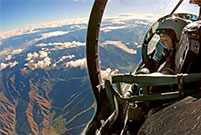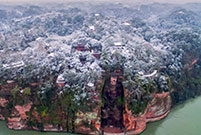

SEOUL, Feb. 4 -- South Korea's defense ministry warned on Thursday of intercepting debris from a rocket, launched by the Democratic People's Republic of Korea (DPRK), which fall on its territory and territorial waters.
Defense Ministry spokesman Moon Sang-Gyun told a regular press briefing that the military is strengthening air defense readiness to shoot down the DPRK's missile or part of fragments that may land on the country's territory or territorial waters.
Moon said intercepting the DPRK missiles that fly over South Korea's territory is an exercise of self-defense rights, noting that the military will take adequate actions from a perspective of self-defense.
The warning came as the DPRK informed international organizations on Tuesday of its plan to put what it called a Kwangmyongsong earth observation satellite into orbit between Feb. 8 and 25.
The satellite will be carried by a rocket, which Seoul denounced as using a banned ballistic missile technology. UN Security Council resolutions ban the DPRK from using such technology.
The rocket launch plan came about a month after Pyongyang's claim on Jan. 6 that it had tested its first hydrogen bomb. The country fired long-range missiles months before or after its previous atomic bomb tests in 2006, 2009 and 2013 respectively.
Two months before its third nuclear detonation in February 2013, the DPRK launched a Kwangmyongsong-3 earth observation satellite into orbit, delivered by a three-stage Unha-3 rocket.
To intercept possible debris from the first stage of a DPRK rocket that are expected to fall on the west waters, the South Korean military will deploy PAC-2 interceptors, the spokesman said.
The PAC-2 can shoot down missiles at an altitude of about 15 km, one of key factors of South Korea's own missile defense system, called the Korea Air and Missile Defense (KAMD), together with long-range surface-to-air missiles (L-SAM) and medium-range surface-to-air missiles (M-SAM) that are being developed with indigenous technology.
According to estimated trajectory, the DPRK missile is expected to fly over South Korea's western border island of Baenggnyeong at an altitude of about 180 km, the spokesman said. But, he said the territorial air is below around 100 km, indicating little possibility for intercepting the DPRK rocket.
The DPRK is expected to test-launch its upgraded long-range ballistic missile at its main Tongchang-ri rocket base on its west coast. The rocket launch station has been covered to conceal detailed preparations for the launch.
Moon said that the DPRK is preparing to launch long-range missiles between Feb. 8 and 25 at the Tongchang-ri missile launch site, without elaborating on details. He noted that the military is closely monitoring the preparation with all available surveillance assets to detect and track the missile.
Meanwhile, South Korean President Park Geun-hye warned that Pyongyang's ballistic missile launch is not to be tolerated.
"North Korea (DPRK)'s announcement of long-range missile launch plan, after conducing nuclear test, is an act to threaten peace of the Korean peninsula and the world that will never be tolerated," Park said in a statement read by Kim Sung-Woo, senior presidential press secretary.
Park said that the DPRK's repeated acts of conducting provocations and raising tensions aimed to threaten South Korean people and maximize their fears, stressing the need for cooperation with the international community.
The DPRK's announcement of rocket launch plan, despite the ongoing discussions on new UN sanctions, reflected a fact that Pyongyang is never scared of UN restrictions at all, Park said.
The president noted that the only way to stop the DPRK's misjudgment is to tighten UN sanctions and make the DPRK recognize that it cannot survive unless the country gives up its nuclear program.
 Have you ever taken these beautiful subways in China?
Have you ever taken these beautiful subways in China? Chinese beauties, foreign models meet in Chengdu
Chinese beauties, foreign models meet in Chengdu Awesome! Aerial pictures taken on J-11 fighter
Awesome! Aerial pictures taken on J-11 fighter A foreign girl explains what China should be proud of
A foreign girl explains what China should be proud of Chinese navy's air-cushioned landing craft in pictures
Chinese navy's air-cushioned landing craft in pictures Chinese pole dancing master opens class in Tianjin
Chinese pole dancing master opens class in Tianjin Splendid Sichuan after snow
Splendid Sichuan after snow College girl of Vancouver crowned Miss Chinese Int'l 2016
College girl of Vancouver crowned Miss Chinese Int'l 2016 Pentagonal Mart becomes the largest vacant building in Shanghai
Pentagonal Mart becomes the largest vacant building in Shanghai Top 20 hottest women in the world in 2014
Top 20 hottest women in the world in 2014 Top 10 hardest languages to learn
Top 10 hardest languages to learn 10 Chinese female stars with most beautiful faces
10 Chinese female stars with most beautiful faces China’s Top 10 Unique Bridges, Highways and Roads
China’s Top 10 Unique Bridges, Highways and Roads PLA takes step forward with new zones
PLA takes step forward with new zones New report examines the demographics and habits of moviegoers in China
New report examines the demographics and habits of moviegoers in China Parents turn to illegal exams to ensure their second child is the gender they want
Parents turn to illegal exams to ensure their second child is the gender they want People look for hidden bribery methods as CCDI tightens inspections over holidays
People look for hidden bribery methods as CCDI tightens inspections over holidaysDay|Week